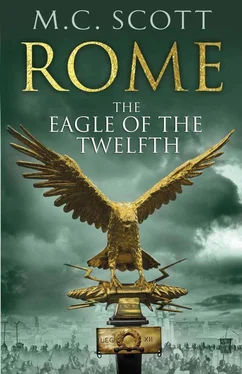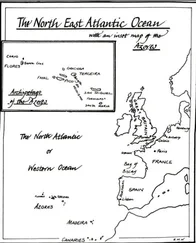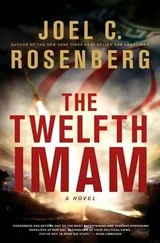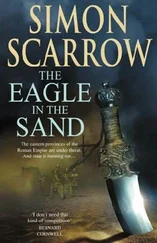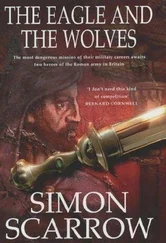M. Scott - The Eagle of the Twelfth
Здесь есть возможность читать онлайн «M. Scott - The Eagle of the Twelfth» весь текст электронной книги совершенно бесплатно (целиком полную версию без сокращений). В некоторых случаях можно слушать аудио, скачать через торрент в формате fb2 и присутствует краткое содержание. Жанр: Исторические приключения, на английском языке. Описание произведения, (предисловие) а так же отзывы посетителей доступны на портале библиотеки ЛибКат.
- Название:The Eagle of the Twelfth
- Автор:
- Жанр:
- Год:неизвестен
- ISBN:нет данных
- Рейтинг книги:5 / 5. Голосов: 1
-
Избранное:Добавить в избранное
- Отзывы:
-
Ваша оценка:
- 100
- 1
- 2
- 3
- 4
- 5
The Eagle of the Twelfth: краткое содержание, описание и аннотация
Предлагаем к чтению аннотацию, описание, краткое содержание или предисловие (зависит от того, что написал сам автор книги «The Eagle of the Twelfth»). Если вы не нашли необходимую информацию о книге — напишите в комментариях, мы постараемся отыскать её.
The Eagle of the Twelfth — читать онлайн бесплатно полную книгу (весь текст) целиком
Ниже представлен текст книги, разбитый по страницам. Система сохранения места последней прочитанной страницы, позволяет с удобством читать онлайн бесплатно книгу «The Eagle of the Twelfth», без необходимости каждый раз заново искать на чём Вы остановились. Поставьте закладку, и сможете в любой момент перейти на страницу, на которой закончили чтение.
Интервал:
Закладка:
‘No!’
I punched my shield at his face and swung my sword in a killing arc around my head, and threw myself bodily at the traitor who had controlled this battle and those before it.
I reached him. I cut straight for his face. He was gone. I slewed to my left ‘Estaph! Take him!’
He was a giant of a man, that Parthian. I felt his shadow fall over me and arms come round me and too late knew what he planned. There was no shield in his grasp, no sword, only two fists like bear paws that met under my diaphragm and rammed the air out of me even as they raised me up and slammed me down; once, twice, three times, until the sword fell from my numbed fingers and my shield was gone and even my helmet rattled beyond my knees.
Horgias was similarly held, though the men who tried to capture him were smaller and he fought like a wild beast until they had to sling ropes about his shoulders to subdue him.
Other men took the Eagle. I saw the sun-kissed gold passed back from hand to hand to hand as if it were just another spoil of war until it was lost from sight in the greater mass of the Hebrew army. Soon there were shouts and a tussle as men fought over its possession.
Locked in the giant Parthian’s embrace, I was still struggling, desperate to die. The Roman commander stood in front of me holding the bow I had dropped. The quiver was still at my hip, with the white fletchings plain to see, naming me openly as the one who had killed his king.
He raised his hand. I thought he was about to strike me and braced myself for it, but he turned it into a gesture so eloquent in its futility that I knew him: Sebastos Pantera, former spy for the emperor, had turned traitor and was leading the Hebrews.
In shock, I spat at his face. Pantera barely noticed. He was staring past my shoulder to where his men squabbled over the Eagle. He shouted an order in urgent, fluent Aramaic, and others after it, curt, sharp, hard as any legate on the field.
Twisting round, I saw some measure of order drawn from the chaos, enough for a phalanx of men to gather round the body of the dead king and his milk-white Berber mare. I saw the woman in white raise her arm from the thick of it, a signal of success.
Pantera spun back to me. His tunic was awash with other men’s blood; his king’s foremost, I think. His skin was as dark as any Syrian’s, but his hair, once oak-brown, had been burnished by the sun to a dark straw, with shades of bronze and almost-copper scattered through. A scar notched his right eyebrow, dragging it upward in a perpetual query.
And those eyes… In Hyrcania I had thought them aged and cynical and understood now how young he must have been, for a lifetime’s pain and weariness had grown in them since then, and only the sharpness remained as it had been: hard-edged and thoughtful.
He raised the bow and held it between us. ‘Three mistakes,’ he said softly. ‘First: I never should have told Cadus that you could shoot with any skill. Second: I should have gone back to look for the bow when I knew I had dropped it. And third…’ He looked past me again to where men still fought over our Eagle. ‘I should have struck Eleazir’s head from his shoulders nine months ago, when we first crowned Menachem.’
He slung my bow over his shoulder, reached for the quiver at my hip. ‘You have lost your Eagle,’ he said, to me, ‘but we have lost a king and a kingdom, and may yet lose our lives. I give you a choice: I will leave you here, to die at Eleazir’s hand — he will crucify you, of that you can be sure — or you can come with me and we can fight our way out of this messand there may be a chance afterwards to recover your Eagle. Choose now. Time is not on our side.’
The taste of death was like iron in my mouth, twisting my tongue. The memory of men gone was all around me, their shades but a step away, beckoning, offering peace beyond measure and the welcome of the gods.
More than anything, I wanted to join Tears. But I felt the shadow of fate settle around me and before my courage could fail I answered as I must, for myself and for Horgias, who had been dragged to my side.
‘We choose life,’ I said. ‘If we have the chance to recover the Eagle, it is our duty.’
Pantera left us then, shouting again in Aramaic. I thought for one moment that we were to be given our weapons, and could follow and kill him, for I wanted to do that very badly.
But he felt the thought and turned on his heel. ‘Bind them,’ he said swiftly. ‘And get the horses. I’ll bring Menachem. We have to get to the tomb before Eleazir’s men. They may have the Eagle, but we have the king and the crown.’
Chapter Thirty
The Eagle of the Twelfth caught the late afternoon sun, magnified it and spilled it down as if from heaven upon the head of Pantera’s enemy, Eleazir, who carried it aloft.
It bathed with fainter light the twelve priests of the Hebrew god who paced behind him in their costly silks, with tablets of onyx and gold upon their breasts and crowns of barely smaller wealth upon their heads.
It reached only faintly the first few layers of the vast crowd that surged and billowed around the procession. By their hundreds of thousands they wailed their grief, but did it softly, for they felt the tension in the air, the threat of violence, as keenly as those of us who had been on the hill’s top these past hours.
That tension surged up to us in roiling waves. It rebounded off the pale rock wall behind us and fell back through the rows of almonds and of olives, the many-coloured flowers and the camphire at the path’s edge, the thorn bushes under which Horgias and I crouched with our eyes to the gaps, seeing down as far as we could while tied at wrist and ankle.
It settled on the body of the man the crowds had cometo mourn, the shrouded, anointed body of Menachem ben Yehuda, late king of Israel, who lay on a bier in front of a cave-tomb carved into the rock with his crown on his chest, a trophy for whomsoever had the courage and the wit to take it.
So focused was I on the parade, on the king, that I did not hear the sound of approaching steps. And so it seemed it was as if from nowhere that a woman’s voice said, ‘I am Hypatia, Chosen of Isis. You are Demalion of Macedonia, last of the Twelfth. Who is it that holds your heart, for whom you grieve with such passion?’
I spun, as fast as a bound man might, and saw the white-robed oracle woman, a vision of black hair and iron-grey eyes, sharp enough to slice open a man’s soul. Her face was the epitome of a woman’s perfection: smooth-skinned, high-browed, with a nose that would have roused Cleopatra to envy. Even now, in the heat of the afternoon, with dust on her head and runnels of sweat pooling at her collarbones, she was, without a doubt, the most beautiful woman I had ever seen.
I thought of Syrion, imagined what he would have given to have met her, and didn’t know whether to weep or to laugh until some sword ended my noise.
I did neither; duty held me still. After a moment, when the woman had not moved, I answered her question. ‘His name was Heraclides. We called him Tears.’
‘Tears?’ Her eyes remained open, but, with a shudder, I saw her mind go elsewhere, leaving me in the presence of a living spectre.
Presently, returning, she said, ‘He was killed, was he not, in the last moments of battle, after you slew our king, but before you were captured?’
I nodded. She made my skin twitch, this woman, and stole the breath from my throat.
She said, ‘He waits for you, but you know that. What perhaps you do not know is that he waits in a place outside time. There is no need to rush to him. He will be there when you are ready and will not know if years have passed or an eye’s blink.’
I did not say I am ready now, but I may as well have done, for I saw her shake her head and shrug her shoulders and make ready to rise.
Читать дальшеИнтервал:
Закладка:
Похожие книги на «The Eagle of the Twelfth»
Представляем Вашему вниманию похожие книги на «The Eagle of the Twelfth» списком для выбора. Мы отобрали схожую по названию и смыслу литературу в надежде предоставить читателям больше вариантов отыскать новые, интересные, ещё непрочитанные произведения.
Обсуждение, отзывы о книге «The Eagle of the Twelfth» и просто собственные мнения читателей. Оставьте ваши комментарии, напишите, что Вы думаете о произведении, его смысле или главных героях. Укажите что конкретно понравилось, а что нет, и почему Вы так считаете.
